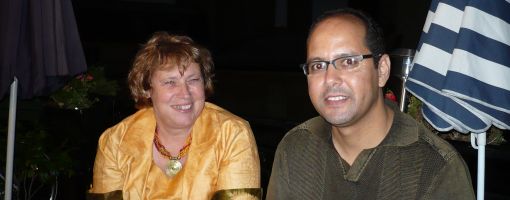
A group of French human rights activists is now being expelled from Morocco. Among them are Claude Mangin (left), who travelled to the country to attend the trials against her husband (right).
Mrs. Mangin and her co-citizens were yesterday detained by plain clothed police officers in the town of Tantan in southern Morocco, and taken to the local police station.
At 1 AM this morning, they were released after 13 hours of custody and interrrogations, and transported to Agadir airport from where they will be expelled.
Mangin had travelled to Morocco to attend the legal process against her husband, Mr. Enaama Asfari. The two are co-founders of the French based Sahrawi human rights organisation CORELSO.
Enaama Asfari was arrested earlier this month in Marrakech. According to his lawyers and his wife, accusations that have been presented against him are all false.
“Naama does not drink, and has never beaten a person in his life”, recounted his wife, Claude Mangin, on telephone from the court in Marrakech, last week.
Without a solid piece of evidence, Asfari is accused of having beaten a Moroccan
woman, threatening with a knife, and drunk driving.
Claude and a group of other French human rights activists and lawyers travelled to Marrakech last week. In the group were also Frédérique Lellouche from the NGO L'Association contre la torture et pour l'abolition de la Peine de mort, trade union activist Pierre Alain Rousse and Western Sahara activist Mireille Brun.
The group is now awaiting the flight that will take them to Paris. They are all being expelled, but Moroccan police has not yet given any explanation as to why.
A press conference is planned in Paris upon their arrival.
Order our Western Sahara poster!
“Try to Visit Western Sahara”…
The Security Council fails Western Sahara and international law
On 31 October 2025, a new resolution was adopted in the UN Security Council calling on the Saharawis to negotiate a solution that would entail their incorporation into the occupying power, Morocco.
Saharawis Demonstrate Against Trump Proposal
The United States has proposed in a meeting of the UN Security Council on Thursday that the occupied Western Sahara be incorporated into Morocco.
Skretting Turkey misled about sustainability
Dutch-Norwegian fish feed giant admits using conflict fishmeal from occupied Western Sahara. Last month, it removed a fake sustainability claim from its website.



